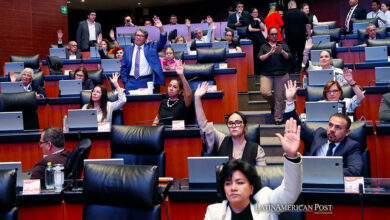Bolivia: Will the opposition be able to stop Evo Morales?
Listen this article
The community goes to the OAS and the IACHR to avoid the re-election of the president of Bolivia

Carlos Mesa, former president and presidential candidate for the October elections this year, is leading the efforts of the Bolivian opposition to stop the reelection of Evo Morales, who is going for his fourth consecutive term. In the first instance, the opposition seeks the support of the Organization of American States (OAS) and the Inter-American Court of Human Rights (Inter-American Court of Human Rights).
Leer en español: Bolivia: ¿Podrá la oposición frenar a Evo Morales?
According to the AFP agency, the first appeal to which Mesa will appeal is the OAS Inter-American Democratic Charter, which ensures the stability of democratic institutions in the governments of the continent. In the past, the letter has been convened in cases such as the political situation in Venezuela and the government of Nicolás Maduro.
All the states of America have ratified this Charter. In that sense, it serves only as an instrument of diplomatic pressure. The situation in Venezuela has not had a significant change other than the withdrawal of international support from the American states. It does not seem to be a solution to the problem of Bolivia.
The second instance to which Mesa will attend is the Inter-American Court of Human Rights, the judicial body specialized in human rights of the OAS. The Court could use the so-called American Convention on Human Rights, which contemplates the right of citizens to be elected to public office; This is the center of the development of this political struggle. To understand this, it is necessary to understand how Morales has the freeway to stand for election.
Background
In 2016, Evo called a constitutional referendum to consult with Bolivians if they agreed that the current president should go to a fourth presidential term. 51.3% of voters (almost 2.7 million people) said no to the initiative promoted by Morales himself.
Thus began a legal battle by the ruling party to force the candidacy of the president. The Movement Towards Socialism (MAS), the party to which the president belongs, has made an active campaign to justify through the number of militants. For primary elections last January, the MAS managed to register just over 900 thousand militants, but only 45.6% voted for the binomial Evo Morales – Álvaro García. This shows less support than expected.
Added to the questioning against these primaries, promoted by the MAS, there was also rejection by the opposition against the decision of the Supreme Court of Justice (TSJ) of Bolivia, which ratified the candidacy of Morales through a ruling. The ruling appeals to the possibility of this to be presented as part of their human rights.
You may be interested in reading: Brazil and Mexico: what is the balance in their first months of government?
What can the Inter-American Court do?
Given that the Inter-American Court provides concepts related to human rights, it is possible that the Bolivian opposition's complaint may be supported. On the one hand, because it is the political participation of a right contemplated in democracies, the thesis that Evo Morales is exercising his full citizenship right, despite constitutional restrictions, may be promoted.
However, and this is the possible scenario, the Court can contemplate the insistence of Morales and the MAS to stand for election as an outrage to democratic institutions. That is, the current government ignored the result of a referendum, made a primary election to amass support and received a suspicious endorsement by the Supreme Court that passes over the Constitution. No full democracy should admit such a scenario.
According to the Tele13 portal, the OAS has already expressed its discomfort with the situation in the face of the elections, calling the eventual re-election of Morales as "without sustenance." It is likely that this position will be replicated with the I / A Court HR, but it could mean only another symbolic effort to delegitimize Morales' aspirations.
Finally, polls in Bolivia do not give a winner to the current president. According to the EFE agency, Mesa leads Morales by only a few points in most of the polls, and he has repeatedly stated that the results of the 2016 referendum will be replicated in October.
LatinAmerican Post | Iván Parada Hernández
Translated from "Bolivia: ¿Podrá la oposición frenar a Evo Morales?"





